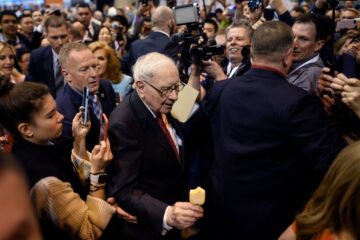After weeks of high volatility, Nvidia (NVDA) investors may finally sigh with relief. The artificial intelligence (AI) leader closed out trading last week in the green, suggesting that May could finally be the month it turns around.
That’s partially because the White House is expected to reveal its new AI diffusion rule on May 15, and it will likely reveal AI policy changes that favor Nvidia and its peers. CEO Jensen Huang has been working hard recently to show lawmakers what he believes is necessary for the industry to thrive.
💵💰Don’t miss the move: Subscribe to TheStreet’s free daily newsletter 💰💵
Despite this positive momentum, it hasn’t been all good news for Nvidia recently. A recent announcement from one of its rivals in China sparked speculation that the company’s global dominance could be threatened.
While the risk for Nvidia is clear, according to Huang, this development could pose dire consequences for the U.S.’s global AI dominance at a highly pivotal time.
Nvidia CEO Jensen Huang recently laid out a major threat to the U.S. AI market that he believes is lurking in China.
Image source: Shutterstock
According to Huang, AI action is needed from US government
Since the year began, Nvidia has faced two major threats, both from China, that caused investors to wonder if its dominance might be compromised. The first occurred in January when Chinese startup DeepSeek released an AI model built on out-of-date Nvidia chips, triggering a massive selloff for NVDA and its peers.
Related: Will Nvidia get hit hard by AI capex risk?
A few months later, tech conglomerate Huawei announced plans to start testing a highly anticipated AI chip that it touted as a rival for Nvidia’s H100, a graphics processing unit (GPU) used by companies such as Tesla and Meta. Huang believes that AI policy needs to reflect both these areas.
According to reports, he recently met with U.S. House of Representatives Foreign Affairs Committee to discuss the threats that he believes China’s progress poses to the U.S. AI market, highlighting some concerning elements he sees.
Some experts, such as Richard Windsor of Radio Free Mobile, have speculated that Huawei’s progress isn’t likely to pose much of a threat to Nvidia. But Huang made it clear he sees things differently, using DeepSeek to help illustrate the problems he thinks it could cause.
Noting the pace at which AI innovation is accelerating around the globe and implying that the U.S. may be left behind, Huang noted that there is a clear danger for American companies. “If U.S. platforms are absent, companies will turn to strategic competitors like Huawei to fill the gap,” he warned.
The Nvidia CEO added that AI leadership is dependent not just on what governments restrict, but what they enable. This comes at a highly pivotal time for the industry, as U.S. tech companies are currently facing restrictions on what they can sell to Chinese buyers.
A senior staff source reiterated Huang’s points, stating that “If DeepSeek R1 had been trained on (Huawei chips) or a future open-source Chinese model had been trained to be highly optimized to Huawei chips, that would risk creating a global market demand for Huawei chips.”
More Nvidia News:
Nvidia shareholders shouldn’t worry about China news, says analystNvidia could see an unexpected benefit from the trade warAmazon directly targets Nvidia with bold new strategy
If that were to happen, it would be a nightmare for Nvidia, as it would severely compromise its share of the AI market, particularly in China, whose tech sector is indeed expanding rapidly and remains the U.S.’s most formidable rival.
Huawei is emerging as Nvidia’s greatest competitor
As Nvidia skyrocketed to the top of the AI market in recent years, experts speculated as to who could be considered its most dangerous competitor. Fellow chipmakers such as Advanced Micro Devices and Intel have proven unable to dethrone it, but now Huawei seems poised to take that crown.
Related: Nvidia CEO sends Washington 10-word message on AI chip change
This is likely why Huang is doubling down on his efforts to ensure that AI policy helps guard Nvidia and its U.S. peers against the threat posed by China and its rivals. Ned Finkle, who serves as vice president of government affairs at Nvidia, has also spoken out against these policies, specifically the AI diffusion rule that imposed restrictions on those to whom Nvidia can sell chips.
The Trump administration is expected to reveal an overhaul of this controversial Biden-era policy on May 15, a likely catalyst for NVDA stock and the entire sector. Both President Trump and Vice President JD Vance have indicated that they believe helping U.S. companies retain their dominance in the global AI market should be a top priority.
With that in mind, it seems likely that the upcoming AI policy rollout may reflect what Huang and Finkle have advocated for, even as the U.S.’s tariffs against China threaten to complicate trade relations.
Nvidia spokesperson John Rizzo noted that Huang also discussed the need for U.S. investment in both AI manufacturing and infrastructure, stating that he “reaffirmed Nvidia’s full support for the government’s efforts to promote American technology and interests around the world.”
Related: Veteran fund manager unveils eye-popping S&P 500 forecast


